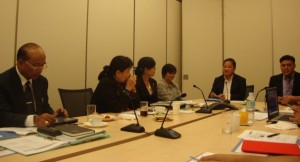
Manila – Government representatives of Myanmar were in the Philippines from June 10 to 14, 2013 to study the community driven development (CDD) strategy being implemented by the DSWD for its Kapit-Bisig Laban sa Kahirapan-Comprehensive and Integrated Delivery of Social Services (KALAHI-CIDSS) program.
The learning visit, which was organized through the partnership of the DSWD and the World Bank, aimed to provide the Myanmar delegates the opportunity to learn about the implementation and impact of Kalahi-CIDSS, as their country is presently preparing for the implementation of CDD.
CDD is a poverty alleviation strategy that puts power back in the hands of the people by giving them the opportunity to have active control in deciding which sub-projects will be implemented in their communities. The goal of Kalahi-CIDSS is to train people who are capable of mobilizing themselves into an empowered citizenry who actively push for the development of their communities.
Aside from the orientation on the Kalahi-CIDSS systems and processes, the delegation, accompanied by representatives of the DSWD and the World Bank, also visited municipalities in Eastern and Western Samar to learn firsthand the impact of the program on the beneficiaries. The delegates had a one-on-one discussion with the project beneficiaries and stakeholders.
DSWD Undersecretary Mateo Montaño thanked the Myanmar delegates for choosing the Philippines as their area of study. Addressing them, he said, “We hope you get the most out of this visit so you can apply it in Myanmar.”
Speaking on behalf of the Myanmar delegation, His Excellency Major General Zaw Winn, the Deputy Minister of Border Affairs, said that he hoped to model the implementation of CDD on Kalahi-CIDSS. He said “CDD can introduce changes for rural development.”
He further thanked the DSWD and the World Bank for organizing the learning visit, saying, “I hope this will provide the opportunity to strengthen the ties between Myanmar and the Philippines.”
Kalahi-CIDSS National Project Manager Edgar Pato said that the ten-year experience of Kalahi-CIDSS taught the program implementers that CDD is not a “one size fits all” strategy, as certain situations will require adjustments in the program design to better respond to the needs of the communities. As such, Myanmar will be able to make changes in the method of implementation of Kalahi-CIDSS to better fit their own country’s needs.
The DSWD is presently preparing for the launching and implementation of the National Community Driven Development Program (NCDDP), the scaling up of CDD into a national strategy for poverty alleviation. According to Undersecretary Montaño, the President recognizes the strength of CDD and has directed for its adaption as a national strategy for development.”
From the 364 municipalities under Kalahi-CIDSS, NCDDP will be covering 900 municipalities in 15 regions across the country. ###


